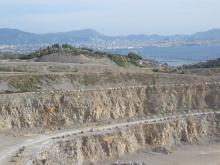
Aggregates are more a way of life than just a career for Nigel Jackson. Claire Symes met him to talk about his role as chairman of the UK's CBI Minerals Group
The UK consumes around 350million tonnes of non-energy minerals each year and the task of representing this sector falls to the
"The CBI Minerals Group brings together all of the UK's extractive minerals companies from the coal, aggregates, clay, fluorspar and metals sectors to provide a voice for the industry," he said.
The UK's
"The CBI's mission is to advise on politics and strategic issues - there is no room to repeat trade association activities unless it is an issue that affects the whole industry. The Mine Wastes Directive was an example of this - the CBI Minerals Group coordinated with
"Our role is to make sure that the licence to operate is protected and make government aware that the demand for minerals is critical to the economy."
Experience
Jackson is well placed to understand the challenges facing the industry - his career in the minerals sector started with his degree in geology at Kings College, London followed with working in construction, waste and minerals after graduation. "I started work for Pinfords as a geotechnical engineer and then joined Taylor Woodrow," he said. "I spent 23 years there and worked in the international coal division in the UK and US, as well as being involved in the industrial minerals division.
In 1992 he left to become managing director of Greenham Construction Materials working in aggregates and waste before he sold the business to Robert Brett in 2000. From there he joined
He was a key player in the formation of the Minerals Products Association, formed by merger of the
"I still get a buzz out of quarries - I don't see them as a scar on the landscape but a thing of beauty. Only a very small part of the subsurface is exposed to us and it is inspiring to be connected with the provision of natural resources," said Jackson. "It is a fantastic industry to work in as there are such a wide range of skills - there are more scientists, engineers and environmentalists than in any other sector. Plus, the industry tends to attract very practical people that care about leaving something for the next generation."
Need for minerals
"There is a need for extraction but it is a contentious issue," said Jackson. "Nonetheless, things are changing. At the last MPA showcase the
"Open days and visits to quarries are helping - openness has been key and becoming a less of an issue. As a result public perception is slowly changing. However, continuous efforts are needed to ensure sites are clean and tidy and hours of work help the industry to be a good neighbour. We will always be judged by the worst."
The CBI represents 99% of all land based extraction in the UK but Jackson still didn't feel that this was enough and is keen to steward the industry into a new era. This led to the development of the Living with Minerals forum and conferences, which are aimed at creating a forum for open debate between the industry and stakeholders.
"The conferences give us a chance to challenge issues like the security of supply and consider the 'what ifs' with discussion of the potential issues and implications of different approaches to a solution," he said.
"The UK consumes 350million tonnes of non-energy minerals each year and we just can't take it for granted that it will always be available. It is a low value commodity so importing minerals is not an option.
"This is not well understood in government, although it is improving. Communicating this is a key part of the CBI Minerals Groups' task and that was partly the drive behind establishing the forum. Living with Minerals is a 10 year campaign and we are planning the fourth conference for 2011."
According to Jackson, there is a general complaint that "you people keep preaching to yourselves" from outside the industry. "But I feel that there is a need to do that to ensure everyone is up to date with current best practice," he said.
"The conference is a chance to get everyone in one room on neutral ground from the various government organisations in England, Ireland and Wales with the non-government organisations such as
"Changing the perception of the voting public is a difficult problem for decision makers as many do not understand the subject well enough so it is our role to educate.
"We are currently carrying out pilot sessions with councillors and planners to see if we can help locally-elected councillors on the need for minerals and help them to understand the issue extends beyond just the need for planning consent. A councillors' tenure is maybe two to three years but a quarry maybe 20 or 30 year and more and the different timescales mean that they don't always fit well together."
One of the next cycles of the Living with Minerals forum will focus on the skills shortage.
The CBI Minerals Group created and financed the forum and is aiming to let it have a life of its own, so has an independent chairman to no organisation can be seen to steer it. "It was a gamble to set up this way as it could have gone against what we were trying to achieve but so far it seems to be working well to find solutions," said Jackson. "It was too good an opportunity to miss putting the right people in the room to have the right conversation to enable us to move forward together. It is either this kind of discussion or we go back to the confrontation. The industry has acted in good faith and shown responsibility and this give us a chance to communicate this."
Although Jackson is pleased with the direction and life of its own that the forum is taking on, he still believes that the CBI has work to do in pressing home the message that you cannot assume mineral supply.
"Supply must be managed and one of the biggest issues affecting the management is the planning legislation," explained Jackson. "Planning has been continually reviewed in the UK since the 1940s but each revision makes it worse - the question is whether we should push for another review or make the best of the existing framework?
"Planning is the key link between supply and demand yet currently legislation is restricting new quarry approvals. Aggregate reserves replenishment is currently at 60% - ideally it should be above 100% but it never will be as the system just cannot deliver this.
"The regional set up for planning just can't cope. The south east development plan has policies that propose reducing aggregate provision by 25% and this challenges other regions to meet the shortfall through imports. This approach is not sustainable. The reduction is based on a number plucked from thin air that is politically driven.
"The public is generally too caught up with sport and entertainment these days to really appreciate their surroundings and demands they place on resources, but when shortages come, they will be more aware."
Despite these challenges and difficult questions, Jackson believes that the industry has come a long way. "Having the heads of organisations such as the Environment Agency praising the sector would have been inconceivable 10 years ago," he said. "The land holding of the quarrying industry in the UK is equivalent to a small national park and there is more understanding that we are managing this natural resource well. There is still a long way to go but we are moving in the right direction. There is no end point though, just a continuous approach to achieve the right public perception - this is not just key in the UK, but right across Europe."







